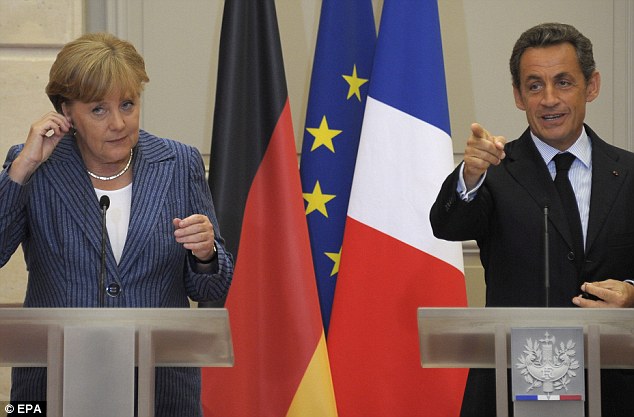A Permanent EU "Crisis"?

On December 7th, French President Nicolas Sarkozy and German Chancellor Angela Merkel presented a 0, 5384220.story">letter to the European Council President Herman Van Rompuy with their proposals for how to solve the current EU crisis. Except their letter was not really a proposal, in that it did not consist of a draft treaty amendment but only broad principles.
But it is clear that the plan they have in mind is creating a state of perpetual “crisis” -- and permanent powers to deal with it -- inside the eurozone and any other non-euro countries that would be bafflingly inclined to join it.
At first blush, it appears that the eurozone is actually getting serious about putting teeth in the Stability and Growth Pact, which seems a very responsible reaction to potential budget malefactors. The letter does not change the Stability and Growth Pact’s target that annual budget deficits must not exceed 3% of GDP, and suggests that a “new procedure should be established to correct breaches of the 3% ceiling” and that “there should be automatic consequences unless the Eurogroup, acting by qualified majority, decides otherwise.”
However, the 3% deficit measure would automatically bring at least 11 of the 17 eurozone countries into that crisis status, basically every OECD country in the eurozone save Finland, Germany, Luxembourg, and Estonia (the OECD does not track tiny Cyprus and Malta, but I used their 2011 numbers for the rest). This represents over 242 million of the eurozone’s roughly 332 million inhabitants, and three of the six eurozone member states with a AAA bond rating, France (5.7%), Netherlands (4.2%), and Austria (3.4%). Keeping this number at 3% means that these “emergency” or “crisis” measures will never expire, nor will intrusive supervision by Union organs.
The debt limit of 60% of GDP sweep just as broadly, again subjecting at least 11 of the member states, all but Slovenia, the Slovak Republic, Luxembourg, and Estonia (not counting Cyprus and Malta, and all AAA rated member states but Germany), to “a sequence of interventions of increasing intensity into Euro area Member States’ rights ... as a focused response to continued infringement” unless a qualified majority decides not to punish them. This accounts for about 322 million of the 332 million inhabitants of the eurozone. Because the deficit and debt groups overlap but do not match, it seems that only Luxembourg and Estonia are off the hook for now.
Such provisions will bring a tremendous amount of logrolling or beggar-thy-neighbor voting on punishment votes. That is not commensurate with the market fetish of these proposals, namely that the markets will see that sanctions will be automatically applied except in very special circumstances. Unless those circumstances are the condition of being France and Germany or other favored parts of a voting bloc including them, the upshot of these sort of faux automatic sanctions is that they will almost certainly be arbitrarily applied. It is curious why France, a Stability and Growth Pact violator as to budget and debt, almost certainly thinks it won’t be punished under the new budget regime.
There is a separate question whether the resources of the entire Union are sufficient to replicate about a dozen national finance ministries to second guess their budgeting process in advance as proposed. Putting aside the staffing of those finance ministries themselves, the talent pool in the rest of the eurozone is likely not deep enough to do what they propose or, said a bit differently, to do it effectively. Confidence is not competence.
The specific interventions and punishments are not described in the letter, but if they are anything like what Van Rompuy hinted, which included suspension of voting rights, they could be very grave.
High deficits and debts have become a serious problem in the eurozone, and the Stability and Growth Pact to date has been ignored in the member states and largely unenforced by the Commission. Even so, this plan does not distinguish between member states that have AAA ratings and Greece, except by the hope that the tender mercies of a qualified majority of those left able to vote might save them from interventions and punishment. It is doubtful the monthly Eurosummit also proposed by the Two will ever disband, given how low they have set the bar to be permanently able to threaten sanctions on almost any eurozone country.
Once again, this shifts the eurozone member state’s responsibility for complying with the Stability and Growth Pact to some subset of states (who themselves are also violators, since almost all are) that have agreed themselves immune from punishment. That is not a formula for engendering market confidence, and it will have an even more sclerotic effect on the democracies in the member states, who forever will have a new excuse to their electorates for the way their national budget, once a product of national legislation, reads the way it does.

